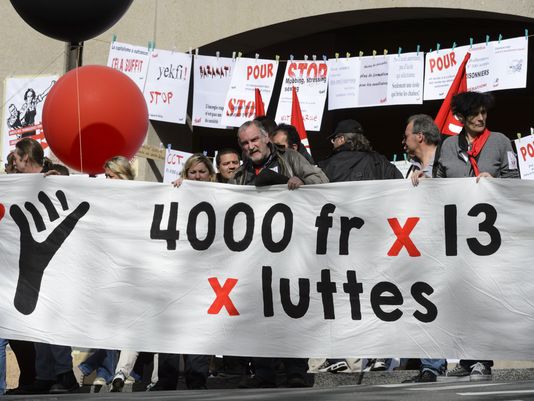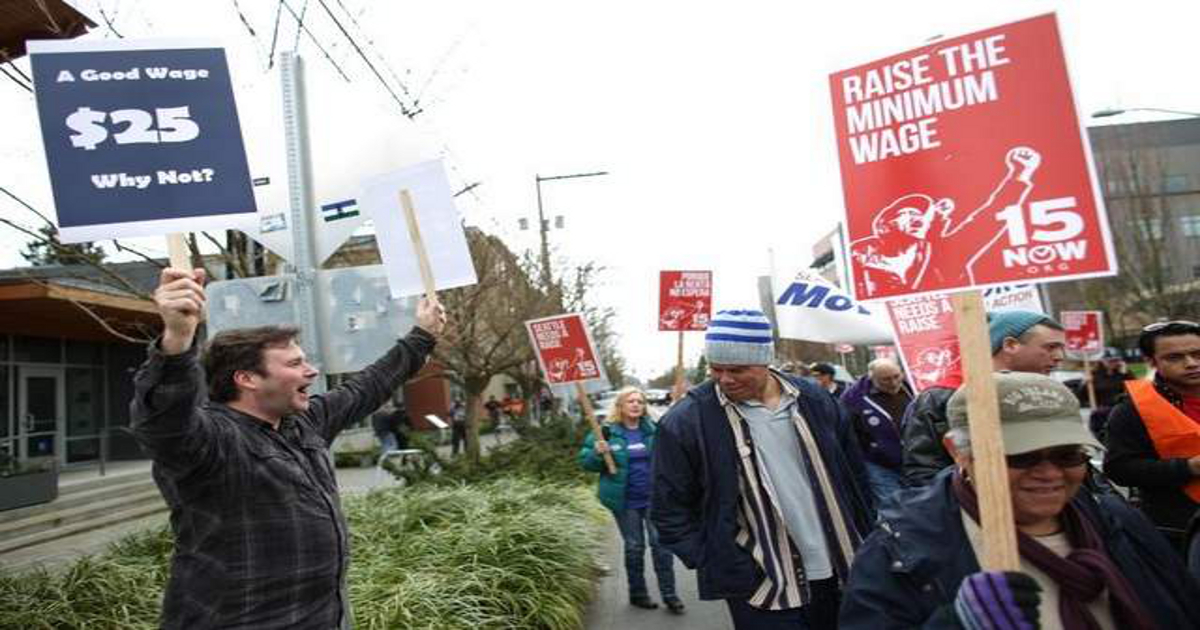Flashback:
– Why Switzerland Has The Lowest Crime Rate In The World (Video)
– Vast Majority Of Swiss Reject $25 Minimum Wage In National Referendum (ZeroHedge, May 18, 2014):
If you want a country that respects free markets, believes in listening to the voice of the majority, and is against meddling in global affairs under the guise of “humanitarian, liberating, and democracy-spreading” intervention, move to Switzerland.
If you want a country controlled by a few academic central-planners with no real world experience, in which the executive usurps power issuing one executive order after another with zero checks and balances, and which will incite a global war if it must with the help of doctored YouTube clips in order to achieve its global national interest, then move… anywhere else.
Six months ago, it was this same Switzerland that, contrary to the prerogatives of the pervasive “fairness doctrine” taking the new socialist world by storm, rejected imposing limits on executive pay. Then mere hours ago, in a move that would give president Obama wealth redistribution nightmares for months, a whopping 77% of Swiss voters rejected an initiative for a national minimum wage of 22 francs, or just under $25, per hour, according to projection by Swiss television SRF. And confirming that when it comes to anti-socialism, Switzerland may well be the last bastion, not a single canton supported the measure.How dare Switzerland not pretend supply and demand doesn’t matter and one can circumvent the laws of common sense and enforce employment and wages by diktat? Simple: Government ministers have fought against the measure and insisted it will damage the economy, running small companies out of business and making it harder for young people to find employment. Perhaps it is time for these same minister to give the US government a few lessons.
“A minimum wage won’t stop poverty“, Economic Minister Johann Schneider-Ammann told The Christian Science Monitor. “This system would be counterproductive.”
Switzerland currently has no minimum wage, but the median hourly wage is about 33 francs ($37) an hour.
AP has more from on location:
Initial results suggest that the Swiss have rejected a referendum proposal to create the world’s highest minimum wage, an idea that government and business leaders criticized as likely to drive Switzerland’s high costs even higher.
Swiss TV reported Sunday that 77% were rejecting the proposal to create a minimum wage of 22 Swiss francs ($24.70) per hour, based on unofficial vote tallies. Official results were expected later Sunday.
The proposal would have eclipsed the existing highest minimum wages in force elsewhere in Europe. Trade unions backed it as a way of fighting poverty in a country that, by some measures, features the world’s highest prices and most expensive cities. But opinion polls indicated that most voters sided with government and business leaders, who argued it would cost jobs and erode economic competitiveness.
AP also adds the following tart pearl: “Referendums are a regular feature of democracy in Switzerland, which features a weak central government and strong state governments.”
Meanwhile elsewhere, such as the Eurozone for example, merely hinting at a referendum is enough to get the abovementioned central-planners blow up your bond market and get your thrown out if not facing a firing squad (see G-Pap and Berlusconi).
So congratulations Switzerland for being one of the last bastions of democracy and having your voice heard, even if we, for one, wholeheartedly agree with your choice that free markets trump “fairness” and wealth redistribution every time.
* * *
For those wondering where we stand on this topic, here are excerpt from what we said in April in “Are The Swiss Going Crazy? $25 Minimum Wage Referendum In May.”
Most of our readers probably know what we think of minimum wages, but let us briefly recapitulate: there is neither a sensible economic, nor a sensible ethical argument supporting the idea.
Let us look at the economic side of things first: for one thing, the law of supply and demand is not magically suspended when it comes to the price of labor. Price it too high, and not the entire supply will be taken up. Rising unemployment inevitably results.
However, there is also a different way of formulating the argument: the price of labor must not exceed what the market can bear. In order to understand what this actually means, imagine just for the sake of argument a world without money. Such a world is not realistic of course, as without money prices the modern economy could not exist. However, what we want to get at is this: workers can ultimately only be paid with what is actually produced.
As Mises has pointed out, most so-called pro-labor legislation was only introduced after enough capital per worker was invested to make the payment of higher wages possible – usually, the market had already adjusted wages accordingly.
However, unskilled labor increasingly gets priced out of the market anyway, which is where the ethical argument comes in. If a worker cannot produce more than X amount of goods or services, it is not possible to pay him X+Y for his work. Under minimum wage legislation he is condemned to remain unemployed, even if he is willing to work for less.
* * *
The first salient point is the fact that once this new minimum wage law is introduced, upward pressure on all wages would likely ensue. Note in this context that Switzerland is awash in newly created deposit money due to the ministrations of the SNB, which is manipulating the Swiss franc’s exchange rate (a few charts on Swiss monetary inflation over recent years can be seen in our article ‘How Safe is the Swiss Franc?’. The article is slightly dated, but it still serves to illustrate the point). So there is no brake on prices and wages due to a lack of money supply inflation – rather the opposite. Naturally, wages would not be the only thing rising under these circumstances – prices would be adjusted accordingly, and in the end the purchasing power of the higher wages would not be greater than before.
The second important point is the one about which enterprises would suffer the most on account of such legislation. When the union official cynically comments that ‘only businesses that cannot be outsourced will be hit’ (i.e., those who cannot vote with their feet and simply flee), he forgets to mention that small and medium-sized companies as a rule cannot ‘outsource’ their operations either, almost regardless of what they are producing. We felt reminded of something a friend of ours mentioned to us recently: “The problem of today’s form of capitalism is that there are not enough capitalists:”
Indeed, an individual entrepreneur running a small business has a very difficult life already, as every new imposition is much harder to overcome for a small business than it is for a large corporation. This is also why we often find that big corporations don’t resist new regulations: they reckon they are likely to keep competition from upstarts at bay. It is laudable that several big Swiss corporations are evidently not following this trend.
If Swiss voters agree to introducing a new minimum wage law, they would end up doing incalculable damage to Switzerland’s entrepreneurial culture. At the moment, Switzerland is still one of the freest economies in the world. It has been extremely successful so far and its achievements would clearly be put at risk. Hopefully Switzerland’s voters won’t be swayed by union’s arguments.
They weren’t.
… Meanwhile, elsewhere:


